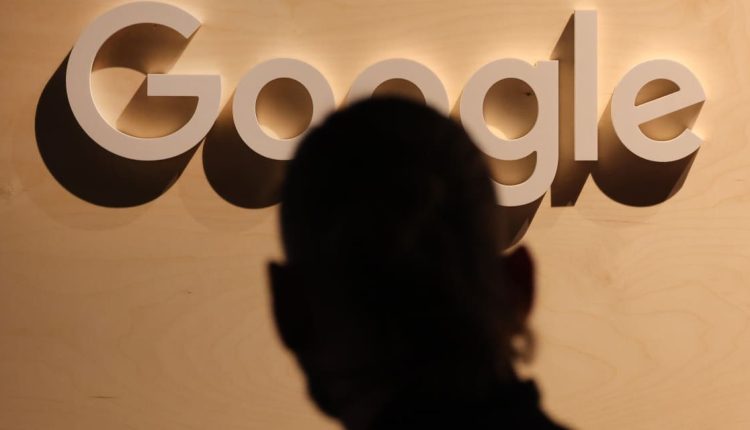The Justice Department’s long-anticipated antitrust case against Google, which accuses the company of illegally monopolizing the internet search market, kicked off Tuesday morning in Washington, D.C.
The case is expected to last until mid-November.
At issue is whether parent company
Alphabet
(ticker: GOOGL) has used steps to solidify its dominance of the search market in a manner that violates federal antitrust law. Google says that its overwhelming market share advantage in internet search reflects the utility of the product, rather than any nefarious behavior.
The proceedings began with an opening statement from Department of Justice attorney Kenneth Dintzer, who argues that Google for 12 years has abused its monopoly in general search. He said that Google uses distribution agreements with
Apple
and and with Android phone manufacturers to block actual and potential rivals.
Dintzer said that Google’s monopoly position comes at “enormous cost to the public,” noting that the company has been slower to create new search technology due to a lack of competition. “Google walks, when it should run,” he said, adding that “Google ignores privacy concerns because they don’t face real competition.”
Dintzer also asserted that Google “has destroyed documents for years” because the company knew they showed violation of antitrust law. He cited a Google program called “Communicate with Care” that trained employees to label certain kinds of communications as carrying attorney-client privilege.
Dintzer’s opening statement will be followed by presentations on behalf of a group of state attorneys that are also party to the case, with an opening statement from Google’s attorneys to follow that.
“Google has helped make the world’s information easily accessible to billions of people,” Kent Walker, Google and Alphabet’s president of global affairs, wrote in a blog post last week. “Our engineers work to offer the best search engine possible, making thousands of improvements every year so that we deliver the most helpful results, for free.”
The case, which was filed by the Justice Department in conjunction with a group of state attorneys general, will focus in particular on Google’s search distribution relationships with Apple (AAPL), Samsung, and other mobile phone providers.
“We plan to demonstrate at trial that our Search distribution agreements reflect choices by browsers and device makers based on the quality of our services and the preferences of consumers,” Walker wrote in the blog post. “In sum, people don’t use Google because they have to—they use it because they want to.”
The case is a bench trial, to be decided not by a jury but by District Court Judge Amit Mehta, an Obama appointee who has been on the court since 2014. The government’s case will be led by Dintzer, a veteran prosecutor who has been working for the government for more than three decades. The defense is led by John Schmidtlein, an attorney who leads the antitrust practice at the law firm Williams & Connolly.
On Friday, Judge Mehta denied a request by some advocacy groups to make an audio feed of the trial available, though Tuesday’s opening statements will be the exception. There will be three opening statements—45 minutes from the Justice Department, 45 minutes from the state attorneys general, and a 60-minute statement from Schmidtlein on Google’s behalf.
J.P. Morgan analyst Doug Anmuth estimates that Google will pay out close to $30 billion to search distribution partners this year, with about $20 billion of that to Apple, $8 billion to Android phone companies and carriers, and the rest to smaller browser companies.
His view going into the trial is that Wall Street could look at this as a win/win for Google: The company could win the case, and preserve the status quo. Or, if Google loses, it could recoup the billions it pays to distribution partners, with potentially only negligible impact on market share or search volumes.
Anmuth wrote that an outright win would be the best outcome for Alphabet shareholders, since it would solidify the company’s very attractive position in search, even though it might not be the best outcome in terms of earnings growth. On the other hand, he estimates that if Google loses the case, it could give up 20% of its search advertising before seeing a negative impact on earnings, given the high-cost associated with maintaining some of that market share.
On the other hand, Anmuth notes that a loss for Google introduces risk that
Microsoft
Bing could become a default search provider on some devices where Google now rules the roost—or that Apple could develop its own search engine. And he notes that there is risk that new options could emerge as generative AI chatbots gain traction.
“Overall, while there are clearly scenarios in which Google could ‘lose’ multiple claims and have higher earnings, those scenarios also result in greater risk and uncertainty,” he wrote. “In this case, we think ‘winning’ for Google really is preserving the status quo.”
Shares of Alphabet were down 0.7% in Tuesday morning trading.
Write to Eric J. Savitz at [email protected]
Read the full article here

